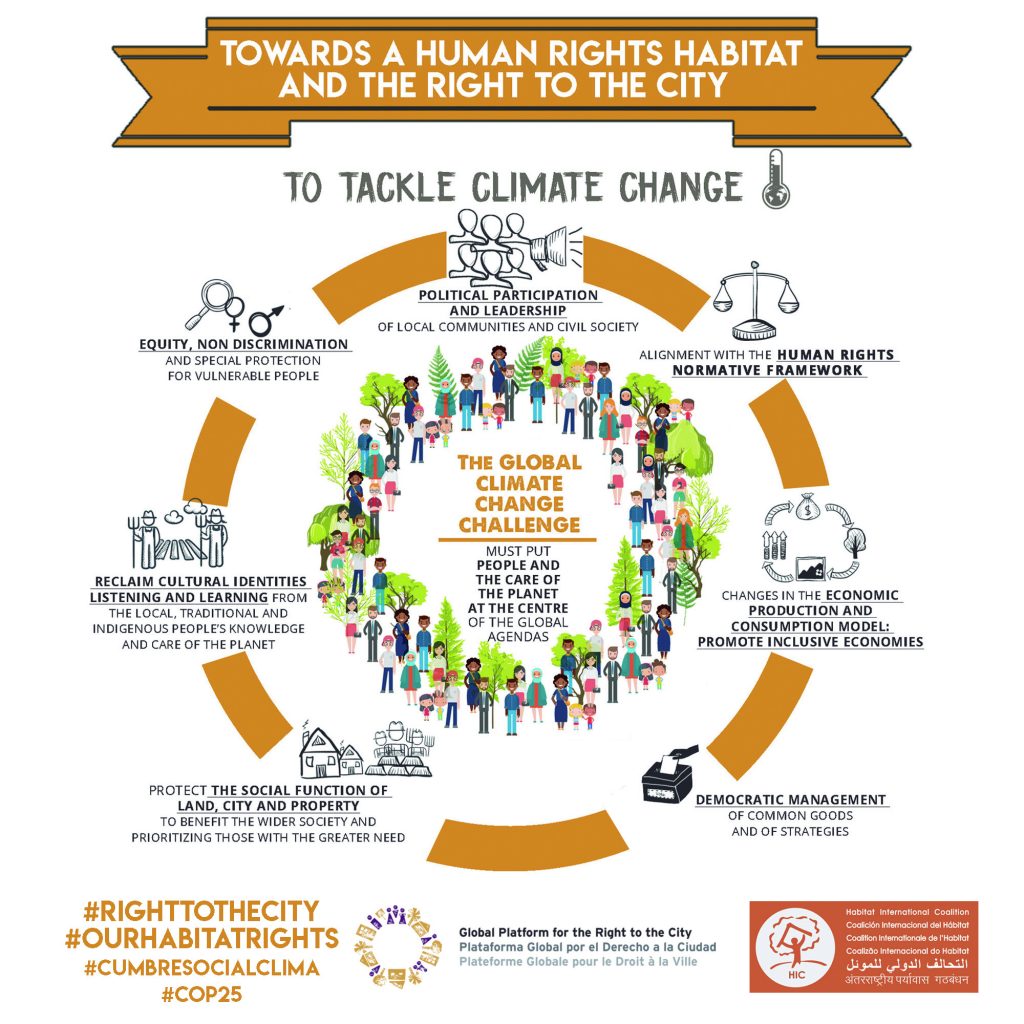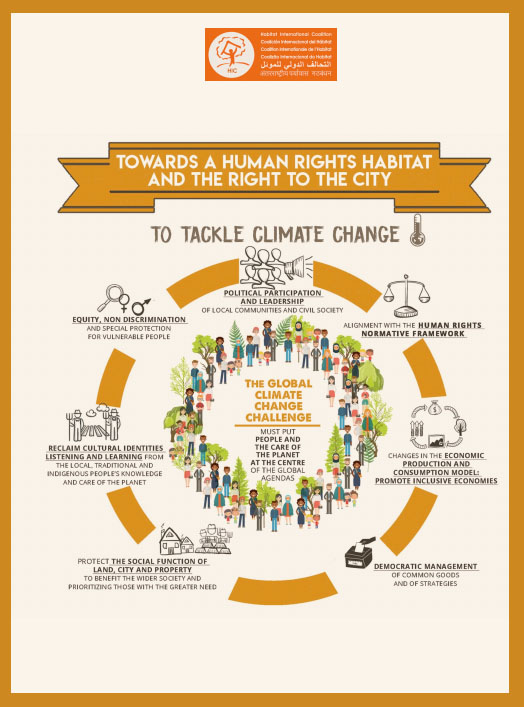Download HIC Statement COP25

 We, social movements, civil society and local governments organizations join forces to persuade COP25 delegates to finally reach and enforce their commitments to tackle the causes and consequences of climate change, by financing and implementing policies that put people at the centre and embrace Human Rights related to Habitat and the Right to the City, striving for a zero emission future and without any forced evictions from right now. We are committed to implement this alternative approach resisting the dominant neo-liberal model.
We, social movements, civil society and local governments organizations join forces to persuade COP25 delegates to finally reach and enforce their commitments to tackle the causes and consequences of climate change, by financing and implementing policies that put people at the centre and embrace Human Rights related to Habitat and the Right to the City, striving for a zero emission future and without any forced evictions from right now. We are committed to implement this alternative approach resisting the dominant neo-liberal model.
Faced with the immobilism of the public authorities, civil society has built a new momentum of mobilizations towards climate justice around the world, this time led by youth. This movement reminds us not only that immediate action is necessary, but also that the responses to the situation cannot be considered without the participation and leadership of civil society.
We see with great concern the recent decision to relocate COP25 from Santiago (Chile) to Madrid (Spain), without modifying the original dates This change has put a strain on civil society’s participation, while reinforcing a trend towards the concentration of such international events in the global north at the expense of the worldwide mobilization for equality and justice. We express our solidarity with Chileans that have put lots of effort in making their voices heard at COP25 in Santiago and call to support and participate in the Peoples’ Summit [1] and the Social Summit for Climate Action [2] both in Santiago and in Madrid [3].
Human Rights related to Habitat and the Right to the City Approach
Any strategy or programme devised to fight climate change must take into account the international human rights standards, recognize the indivisibility of such rights and put the focus on the world’s most vulnerable populations. This integrated approach is essential to address the structural causes of the climate crisis, as well as the responsibility for the violations, with preventive and corrective actions to ensure that urban and rural communities achieve their wellbeing with respect and protection of the ecosystems in which they live. For this, it is urgent to change the current economic neo-liberal model based on real estate speculation, extractivism and fossil fuels, shifting away from the current focus on unsustainable production and consumption and seeking a balance with natural ecosystems; make visible and strictly regulate and control polluting industries and practices; open a dialogue with the trade unions and the degrowth movement and promote environmental justice. Moreover, it is urgent to strengthen research processes, contributing to generate co-produced knowledge that brings together scientific and grassroots perspectives for the creation of constructive ecological alternatives that can be implemented in cities and rural areas.
The Right to the City[4] approach has a lot to offer on such a course, due to its commitment to an economic and urban paradigm that focuses on justice, inclusiveness and diversity. Taking into account all inhabitants and an environmental balanced territorial approach that redistributes benefits and opportunities, the Right to the City enhances the links between urban and rural areas and fosters more sustainable and inclusive economic patterns, always placing community participation at the core. Moreover, the Right to the City can provide a common framework for other global agendas, such as the Sustainable Development Goals and the New Urban Agenda, articulating its different elements and providing concrete strategies for their territorial implementation with a particular focus on tackling social and spatial exclusion.
Democratic management of the commons and of strategies to tackle climate change
A human rights, gender and intersectionality approach is essential in order to respond adequately to climate change and to protect those who are most vulnerable. To this end, establishing adequate protection and regulation in territories based on the commons is essential to promote the democratic management of resources, cities and land. It is further essential the effective participation of inhabitants in all planning processes, including those for mitigating the effects of climate change. It is fundamental to prioritize practices and policies that guarantee the human right to water, its protection and equitable distribution in quality and quantity, as well as the functioning of ecosystems.
The social function of land, city and property
The social function of anything is its use to benefit the greater society, prioritizing those with the greater need. Thus, the social function of land, city and property in the development of human settlements is essential to guarantee a more equitable distribution of the benefits of any economic system, as well as a more balanced and sustainable approach to urban and rural development. Protecting the social function of land, city and property involves securing the Human Rights related to Habitat of the urban poor by providing security of tenure and adequate housing, basic services, infrastructure and facilities in all types of settlements, both formal and informal.
Environmental restoration for the benefit of the wider society, prioritizing those with the greater need, is an obligation for states and an opportunity for local communities to create sustainable job alternatives and take stewardship of the environment in which they live.
Political Participation
We urge the effective participation (with voice and vote) of local communities in all mitigation and adaptation strategies and policies to improve their effectiveness and recover ancestral and local knowledge, technologies and discourses under the process of the social production of habitat. This participation must pay special attention to the proposals coming from the needs of women, migrants, people with disabilities, children, youth and the poor. Building climate-resilient societies starts with understanding and vigorously addressing the challenges faced by vulnerable communities.
Equity, Non-discrimination and Special Protection in Vulnerable Situations
It is crucial to target social, gender, economic and territorial inequalities. We need to face authoritarian and neo-colonial policies, and support participatory and inclusive strategies, such as a North-South and South-South transfer of investment, knowledge and technology; to ensure equality women’s land tenure, ownership and housing rights; and to recognize and foster rural – urban linkages. In addition, in the face of migration due to natural disasters and other climate related events, it is also urgent to adopt an inclusive citizenship approach in which all inhabitants are considered as citizens and granted equal rights.
Communities, in an organized and protagonistic way, should be able to upgrade their own housing, services, public spaces and community spaces through the implementation of constructive systems that use natural local materials and traditional, sustainable building techniques[5]. This must be done in order to reclaim cultural identities and must be executed while drastically reducing CO2 emissions and the overall environmental impact.
A participatory approach under the leadership of communities should also be taken to address losses and damages, avoid forced evictions and rehouse, as a last resource, communities affected by the consequences of climate change such as droughts, floods, landslides and rising sea levels, while following human rights standards of housing, basic services, workers’ rights, and so forth.
A participatory and inclusive strategy to tackle climate change leaves no room for any form of the criminalization or persecution of those defending the environment and human rights. We stand in solidarity with all of those fighting to protect and defend their communities and our planet.
Inclusive and solidary economies
Climate change is a consequence of a production and consumption model that has enhanced social and spatial inequalities, endangered and destroyed our ecosystems and been economically and socially exclusionary to many. Moreover, certain climate policy measures have excluded low-income population and are instrumentalized for the purpose of infrastructural development or tourism industry. It is vital to recognize and support other conceptualisations and practices of how to produce, consume, work, build and live that are already being materialised around the world such as solidarity economies, the social production of habitat, and cooperative work schemes.
In this regard, food sovereignty and the right to food should be promoted to face climate scenarios, in which the capacities of the population are strengthened through agro-ecological practices as alternatives that allow for the climate resilient production and consumption of food. We must also recognize and support the informal sector, such as recycling initiatives with informal recyclers, whose contribution must be recognised. It is also essential for the rescue and preservation of native species that there is a continuation of ancestral practices and values in the provision of nutritious and healthy food for families, according to the properties and particularities of each territory and under a scheme of fair circulation.
We launch an urgent appeal to COP25 delegates to put people and the planet at the centre of the global agendas and to embrace Human Rights related to Habitat and the Right to the City to adopt, finance and implement consistent policies to tackle climate change.
”For the right of all people to a safe place where they can live in peace, dignity and harmony with nature, both current and future generations”
[1] Peoples’ Summit. See: https://cumbredelospueblos2019.org/
[2] Social Summit for Climate Action. See: https://www.porlaaccionclimatica.cl/
[3] Ecologists in Action. See: https://www.ecologistasenaccion.org/131342/movilizacion-sin-precedentes-frente-a-la-cop25/
[4] The Right to the City is the right of all inhabitants, present and future, permanent and temporary, to inhabit, use, occupy, produce, govern and enjoy just, inclusive, safe and sustainable cities, villages and human settlements, defined as commons essential to a full and decent life. You can read more on the Right to the City here: https://www.right2city.org/the-right-to-the-city/
[5] In this sense, we support the campaign and declaration on the use of local natural materials from the point of view of CO2 reduction among others, produced by HIC member organizations of Latin America. This campaign urges the visualisation of its benefits and the need to support the initiatives that use them instead of obstructing and criminalizing them.
